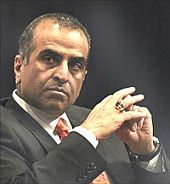 Expectations of a slowdown in growth of the Indian cellphone market will impel Bharti Airtel to continue to look at acquisitions or mergers in the global market, though the opportunities of another large-size deal such as the aborted one with South Africa's MTN are limited, especially in high growth markets like Africa and some parts of Asia.
Expectations of a slowdown in growth of the Indian cellphone market will impel Bharti Airtel to continue to look at acquisitions or mergers in the global market, though the opportunities of another large-size deal such as the aborted one with South Africa's MTN are limited, especially in high growth markets like Africa and some parts of Asia.
Says Vivek Gupta, telecom specialist in BMR Advisors, a consultancy: "Telecom companies in India are accustomed to being valued at healthy CAGRs (compounded annual growth rates) of 20-25 per cent for a pretty long time. But with increased competition and limited domestic triggers, growth will be muted and you can expect CAGRs of 7-10 per cent. Bharti has to go for inorganic growth abroad and the failure of the deal is a disappointment."
Telecom merger and acquisition experts say there are very limited opportunities for a big-bang acquisition, though they are some deals worth looking at for Bharti. Such as with Kuwait-based Zain Telecom, which operates in 24 countries in West Asia and Africa, and has a subscriber base of over 69 million (compared to around 107 million of MTN). The company is working out a deal with a consortium of Indian telecom companies led by the Delhi-based Vavasi Group, which also hopes to rope in state-owned Bharat Sanchar Nigam Ltd (BSNL) and Mahanagar Telephone Nigam Ltd (MTNL) and a Malaysian investor, to acquire a 46 per cent stake in the company for around $13.7 billion. But, both MTNL and BSNL have said they have still not committed to the deal.
In Asia, experts say, Millicom International, which has already sold its assets in Cambodia and Laos, is now looking to divest its Sri Lankan operations. And one of the bidders is Bharti Airtel, which already operates in the country. Many say the company might later want to divest its telecom businesses in Africa, though no such formal proposal is on the table.
South Africa's third mobile operator, Cell-C, which was looking at suitors last year, could be another target for Bharti.
Experts say another option for Bharti is to go for a combined strategy of picking up small state-run telcos and win licences through bidding. "Mobile licences in Zambia, as well as in Nigeria, are expected to come for bidding soon. You could follow the Essar strategy, of planning to pick up a substantial stake in Warid Telecom and picking up small operations in Kenya, Uganda and Congo. But this is a slow and time consuming process, which might not fit Bharti's aggressive global ambition," said an expert who closely followed the Bharti-MTN deal.
But he also points out that being a third or fourth player in African markets would put Bharti at a disadvantage, as it would be given spectrum only in the 1,800 MHZ band. "Considering the low density of these states, you cannot make money on an 1,800 MHz band: it would require huge investments," he adds.
The Bharti-MTN deal, according to sources close to the Indian company, failed because of the sudden insistence on creating a dual listed structure by the South African government in the middle of September, which was not part of the agreement inked between the two sides, which were placed before the National Treasury there. The application to the Treasury had all the commitments from both sides on the deal put on paper and signed. Obviously, the Indian government, while open to the idea, was unable to give any timeline for allowing dual-listed companies, as it would require full capital account convertibility.
Most analysts, however, say that Bharti can sustain its growth only by entering high-growth markets like Africa, which has been growing at 25 per cent and has over 370 million mobile subscribers, almost the size of India. It does not have the cash to acquire European companies, whose market capitalisation and revenues are much bigger than that of Bharti. In any case, these markets are already saturated. It could also look into some growth markets in Asia, such as Indonesia, which have not saturated as mobile markets.






